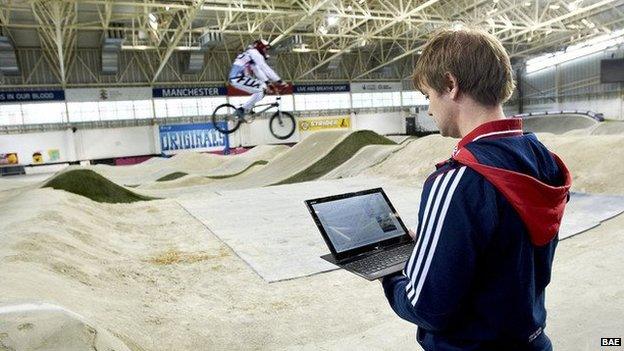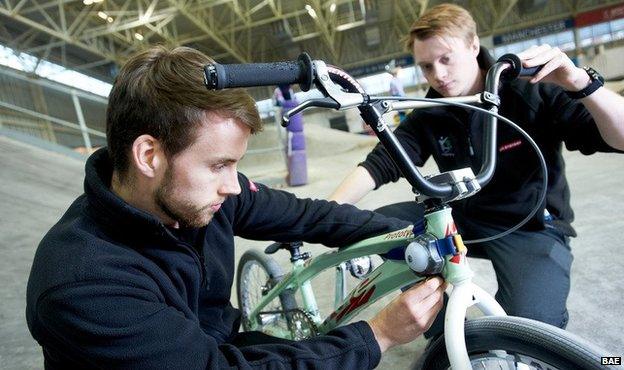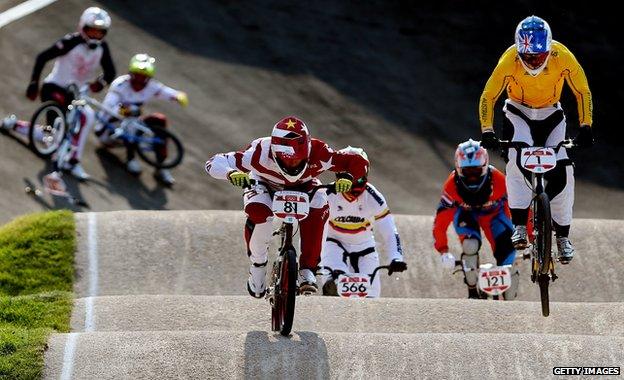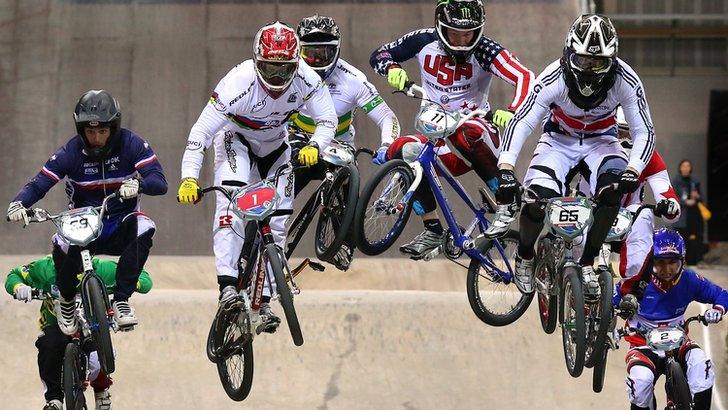BMX racers to benefit from BAE's drone technology
- Published

Coaches can get performance analysis feedback about the BMX racers in real-time
Great Britain Cycling Team's BMX squad is fitting its bikes with tech developed for drones to try to shave milliseconds off its race times.
Miniature infrared lamps are fixed to the off-road two-wheelers, and they're monitored using sensors placed at a track's sides.
These provide data to an app, which suggests ways the cyclist can be more efficient.
The move is the result of a partnership with the defence firm BAE Systems.
It said it originally developed the technology as part of a "sense and avoidance" system for unmanned commercial aircraft, external to help them prevent mid-air collisions with other flying objects.
It has been adapted to record the trajectory of the cyclists in the air after they make their jumps as well as their movements on the ground. It is hoped they can use the information to improve their techniques and race strategies ahead of the Olympic Games in Rio de Janeiro next year.
The BMX team was previously reliant on data from timing loops buried into test tracks for feedback, but the extra data should provide deeper insights into how team members change speed as they handle jumps.
"In an elite sport such as BMX, where riders are travelling around 40kph [25mph] and spending more than 40% of the race in the air, every millisecond counts and one imperfection for your form can put you at a disadvantage," commented BMX squad member Liam Phillips.
"[This] will revolutionise the way we train, allowing us to analyse our techniques with a new-found precision."

The tests involve fitting special lamps to the team's BMX bikes
The app displays its findings in real-time, meaning the athletes can get feedback as soon as they complete a lap.
"They can race round the track, take the jumps and immediately see how their performance has been compared to other runs perhaps on the same day by that [same] rider, or maybe by a different rider on a different day," said Kelvin Davies from BAE Systems.
Richard Moore - a former racing cyclist who represented Scotland at the 1998 Commonwealth Games and who now covers the sport as a journalist - said that it was not uncommon for road-based champions to be given access to such cutting-edge tech.
But he remarked that it could still give the UK's BMX squad an edge that its rivals lacked.

Latvia, the US and France dominated the BMX medals in the 2012 Olympics
"BMX is not really at the vanguard of this kind of stuff - it's usually seen as a cool kids activity, but it's been included in the Olympic Games since 2008 and that has upped the ante," he told the BBC.
"Sports like that are there to be exploited in terms of finding performance analysis gains.
"Most countries are not putting a lot of emphasis on BMXing, and I'd be shocked if any other place in the world was treating it with the same kind of seriousness.
"By contrast, in road cycling they have data for everything, and on the track - where there's not quite the same amount of money involved - it's still getting there."
- Attribution
- Published10 May 2015

- Attribution
- Published15 April 2015

- Published13 May 2013
